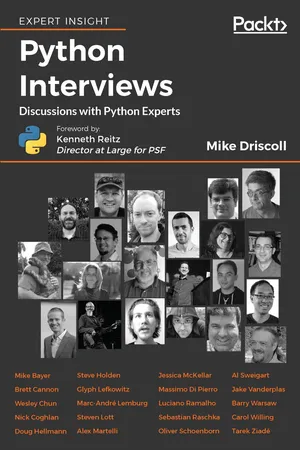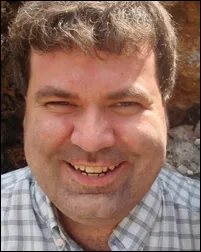
- 366 pages
- English
- ePUB (mobile friendly)
- Available on iOS & Android
Python Interviews
About this book
Mike Driscoll takes you on a journey talking to a hall-of-fame list of truly remarkable Python experts. You'll be inspired every time by their passion for the Python language, as they share with you their experiences, contributions, and careers in Python.About This Book• Hear from these key Python thinkers about the current status of Python, and where it's heading in the future• Listen to their close thoughts on significant Python topics, such as Python's role in scientific computing, and machine learning• Understand the direction of Python, and what needs to change for Python 4Who This Book Is ForPython programmers and students interested in the way that Python is used – past and present – with useful anecdotes. It will also be of interest to those looking to gain insights from top programmers.What You Will Learn• How successful programmers think• The history of Python• Insights into the minds of the Python core team• Trends in Python programmingIn DetailEach of these twenty Python Interviews can inspire and refresh your relationship with Python and the people who make Python what it is today. Let these interviews spark your own creativity, and discover how you also have the ability to make your mark on a thriving tech community. This book invites you to immerse in the Python landscape, and let these remarkable programmers show you how you too can connect and share with Python programmers around the world. Learn from their opinions, enjoy their stories, and use their tech tips.• Brett Cannon - former director of the PSF, Python core developer, led the migration to Python 3.• Steve Holden - tireless Python promoter and former chairman and director of the PSF.• Carol Willing - former director of the PSF and Python core developer, Project Jupyter Steering Council member.• Nick Coghlan - founding member of the PSF's Packaging Working Group and Python core developer.• Jessica McKellar - former director of the PSF and Python activist.• Marc-Andre Lemburg - Python core developer and founding member of the PSF.• Glyph Lefkowitz - founder of Twisted and fellow of the PSF• Doug Hellmann - fellow of the PSF, creator of the Python Module of the Week blog, Python community member since 1998.• Massimo Di Pierro - fellow of the PSF, data scientist and the inventor of web2py.• Alex Martelli - fellow of the PSF and co-author of Python in a Nutshell.• Barry Warsaw - fellow of the PSF, Python core developer since 1995, and original member of PythonLabs.• Tarek Ziade - founder of Afpy and author of Expert Python Programming.• Sebastian Raschka - data scientist and author of Python Machine Learning.• Wesley Chun - fellow of the PSF and author of the Core Python Programming books.• Steven Lott - Python blogger and author of Python for Secret Agents.• Oliver Schoenborn - author of Pypubsub and wxPython mailing list contributor.• Al Sweigart - bestselling author of Automate the Boring Stuff with Python and creator of the Python modules Pyperclip and PyAutoGUI.• Luciano Ramalho - fellow of the PSF and the author of Fluent Python.• Mike Bayer - fellow of the PSF, creator of open source libraries including SQLAlchemy.• Jake Vanderplas - data scientist and author of Python Data Science Handbook.Style and approachThis is a book of one-to-one interviews with leading Python programmers and luminaries in the field.
Tools to learn more effectively

Saving Books

Keyword Search

Annotating Text

Listen to it instead
Information
Python Interviews
Python Interviews

mapt.io Why subscribe?
- Spend less time learning and more time coding with practical eBooks and Videos from over 4,000 industry professionals
- Learn better with Skill Plans built especially for you
- Get a free eBook or video every month
- Mapt is fully searchable
- Copy and paste, print, and bookmark content
PacktPub.com
<[email protected]> for more details.Foreword
Contributor
About the Author

Packt is Searching for Authors Like You
Preface
Chapter 1. Brett Cannon

importlib. Among his open source achievements is caniusepython3 and he is the co-author of 17 successful Python Enhancement Proposals.Discussion themes: core developers, v2.7/v3.x, Python sprints.Catch up with Brett Cannon here: @brettsky
Brett Cannon: 'The feeling of boundless creativity that this tool provided just engulfed me. That's how I got into programming.'
Table of contents
- Python Interviews
Frequently asked questions
- Essential is ideal for learners and professionals who enjoy exploring a wide range of subjects. Access the Essential Library with 800,000+ trusted titles and best-sellers across business, personal growth, and the humanities. Includes unlimited reading time and Standard Read Aloud voice.
- Complete: Perfect for advanced learners and researchers needing full, unrestricted access. Unlock 1.4M+ books across hundreds of subjects, including academic and specialized titles. The Complete Plan also includes advanced features like Premium Read Aloud and Research Assistant.
Please note we cannot support devices running on iOS 13 and Android 7 or earlier. Learn more about using the app